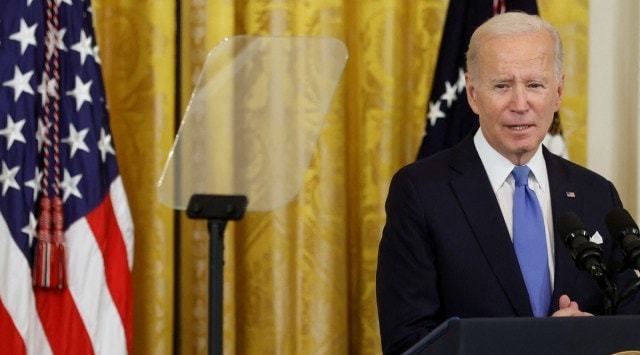Stay updated with the latest - Click here to follow us on Instagram
New U.S. sanctions on Russia hit top officials and the defense and technology sectors
The Biden administration was not alone in announcing punitive measures in response to Russia’s illegal annexation.
 U.S. officials have been discussing a price cap on Russian oil with foreign counterparts, and finance ministers from the Group of 7 nations recently voiced approval for such a move, but governments have yet to decide on final mechanisms or a price. (Reuters)
U.S. officials have been discussing a price cap on Russian oil with foreign counterparts, and finance ministers from the Group of 7 nations recently voiced approval for such a move, but governments have yet to decide on final mechanisms or a price. (Reuters)The Biden administration is enacting a round of new sanctions aimed at further crippling Russia’s defense and technology sectors and other industries, as well as cutting off more top officials and their families from global commerce, to punish Moscow for its efforts to annex parts of eastern Ukraine.
The Treasury and Commerce Departments will impose sanctions and export controls on any companies, institutions or people who “provide political or economic support to Russia for its purported annexation,” White House officials said Friday.
“Make no mistake: these actions have no legitimacy,” President Joe Biden said in a statement. “I urge all members of the international community to reject Russia’s illegal attempts at annexation and to stand with the people of Ukraine for as long as it takes.”
U.S. Secretary of State Antony Blinken said in a separate statement that “the United States unequivocally rejects Russia’s fraudulent attempt to change Ukraine’s internationally recognized borders”.
“This is a clear violation of international law and the United Nations Charter,” he added. “In response, the United States and our allies and partners are imposing swift and severe costs.”
The moves fulfill longtime vows by the Biden administration to punish any move by Russia to annex captured Ukrainian territory. But just as those threats failed to deter Russian President Vladimir Putin, it is unclear whether the new penalties — which compound a slew of crushing sanctions imposed in recent months — will blunt his determination.
The Treasury Department said as part of the broad announcement that it is enacting sanctions against 14 international companies for supporting supply chains of the Russian military.
The Treasury Department is putting nearly 300 members of the Parliament on a sanctions list, along with Elvira Sakhipzadovna Nabiullina, the governor of the Central Bank of Russia; Olga Nikolaevna Skorobogatova, the first deputy governor of the bank; Alexander Valentinovich Nova, a deputy prime minister; and relatives of members of the National Security Council. U.S. agencies had already put Russian security council members on lists.
The State Department also is imposing visa restrictions on more than 900 Russian officials.
The Commerce Department is adding 57 entities from Russia and the Crimea region of Ukraine, which the Russian military forcibly occupied in 2014, to what it calls the entity list, which limits commercial transactions. Officials also plan to try to ensure that companies outside the United States are restricted in the business they can do with those on the list. The Commerce Department now has 392 entities linked to Russia on the list.
The Biden administration was not alone in announcing punitive measures in response to Russia’s illegal annexation.
Britain’s Foreign Office on Friday announced a series of sweeping new sanctions on key services and placed a ban on 700 goods “that are crucial to Russia’s industrial and technological capabilities.” It also put in place an asset freeze and travel ban for Nabiullina.
Biden said the United States would “continue to support Ukraine’s efforts to regain control of its territory by strengthening its hand militarily and diplomatically,” citing $1.1 billion in new security aid his administration announced for Ukraine this week. He added that he anticipated signing legislation from Congress, in response to a White House request, that will provide an additional $12 billion in U.S. aid for Ukraine.
Despite the latest announcement of sanctions, the Biden administration is still refraining from imposing new penalties on purchases by international companies of Russian oil and gas, the biggest source of revenue for the Kremlin. Russia has been making more money from energy sales than it did before Putin ordered a full-scale invasion of Ukraine in February, despite boycotts of purchases by the United States and major European nations. China, India and Turkey have negotiated discounted prices on Russian oil and increased their purchases.
U.S. officials have been discussing a price cap on Russian oil with foreign counterparts, and finance ministers from the Group of 7 nations recently voiced approval for such a move, but governments have yet to decide on final mechanisms or a price.



- 01
- 02
- 03
- 04
- 05




























